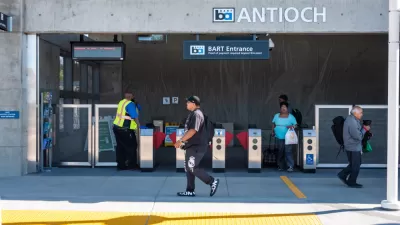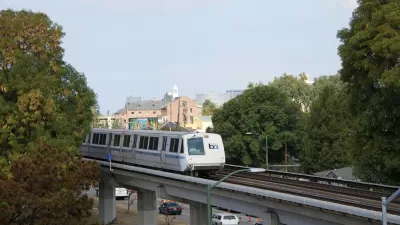In an opinion piece bemoaning the passage of legislation that gives the BART board new land use planning authority, BART Director Deborah Allen argues that planners won't make good directors because they lack independence.

After California's controversial Senate Bill 827 died last April, another bill that dealt with the preemption of local land use authority received more attention, particularly from the East Bay cities where it would apply.
The ink of Gov. Jerry Brown's signature on Assembly Bill 2923: San Francisco Bay Area Rapid Transit District: transit-oriented development had barely dried before Bay Area leaders expressed concerns about giving zoning authority to the BART board, even if only applied to its own parking lots.
One of the more interesting opinions was from BART Board of Directors member Debora Allen, whose district covers stations in the Contra Costa County cities of Concord, Lafayette, Pleasant Hill, and Walnut Creek.
The "legislation giving BART directors zoning authority on the vacant land and parking lots surrounding suburban stations represents a public policy setback for California," writes Allen on Oct. 10 for the East Bay Times. "Cities no longer have authority over things like building height, density, parking replacement and low-income housing ratios."
Readers may find it surprising that the bill, authored by Assemblymembers David Chiu (D-San Francisco) and Timothy S. Grayson (D-Concord) to address the region's housing shortage, was not sponsored by the nine-member elected BART Board of Directors.
In a Sept. 30 statement on BART's new land use authority, BART General Manager Grace Crunican writes that "the BART Board of Directors took an official 'neutral' stance" on the bill, adding:
BART's aim is to partner with the community to build 20,000 new housing units at its stations by the year 2040, and to ensure that at least 35% are affordable.
In her column, Allen singles out professionals in land use planning and related fields, casting a rather wide net, that BART directors need be wary of.
BART directors now and in the future must be capable of making decisions that consider the specific economic needs of each community, without the undue influence of urban planners, land-use consultants, developers, builders, architects, engineers and unions.
It's not just BART directors, though, that should be concerned about the influence of professionals with land use planning expertise, adds Allen. Voters should be as well.
Given the new control handed the regionally elected nine-member BART board, it is more important than ever that we elect directors who can demonstrate their independence from special interests.
Those who already feared the flow of special interest money into BART elections now have cause for greater concern as outside interests try to influence directors suddenly given new power. This November, there are four career urban planners or land-use consultants running for BART director, one in each of the four districts on the ballot.
There is some irony to Allen's singling out of planners when the profession, as represented by the California Chapter of the American Planning Association, actually opposed the bill.
Much like Sen. Scott Wiener's SB 827 (which apparently will be reintroduced next year), AB 2923 has elicited strong reactions from policymakers and others concerned about urban issues. On the opposite side of the spectrum, Steven Falk, city manager of Lafayette for the last 22 years, cited the city council's opposition to the bill as having factored into his retirement announced last month.
Hat tip to Bill Murray for his perceptive comment.
FULL STORY: Opinion: New BART housing law makes elections much more critical

Study: Maui’s Plan to Convert Vacation Rentals to Long-Term Housing Could Cause Nearly $1 Billion Economic Loss
The plan would reduce visitor accommodation by 25,% resulting in 1,900 jobs lost.

Alabama: Trump Terminates Settlements for Black Communities Harmed By Raw Sewage
Trump deemed the landmark civil rights agreement “illegal DEI and environmental justice policy.”

Why Should We Subsidize Public Transportation?
Many public transit agencies face financial stress due to rising costs, declining fare revenue, and declining subsidies. Transit advocates must provide a strong business case for increasing public transit funding.

Paris Bike Boom Leads to Steep Drop in Air Pollution
The French city’s air quality has improved dramatically in the past 20 years, coinciding with a growth in cycling.

Why Housing Costs More to Build in California Than in Texas
Hard costs like labor and materials combined with ‘soft’ costs such as permitting make building in the San Francisco Bay Area almost three times as costly as in Texas cities.

San Diego County Sees a Rise in Urban Coyotes
San Diego County experiences a rise in urban coyotes, as sightings become prevalent throughout its urban neighbourhoods and surrounding areas.
Urban Design for Planners 1: Software Tools
This six-course series explores essential urban design concepts using open source software and equips planners with the tools they need to participate fully in the urban design process.
Planning for Universal Design
Learn the tools for implementing Universal Design in planning regulations.
Smith Gee Studio
Alamo Area Metropolitan Planning Organization
City of Santa Clarita
Institute for Housing and Urban Development Studies (IHS)
City of Grandview
Harvard GSD Executive Education
Toledo-Lucas County Plan Commissions
Salt Lake City
NYU Wagner Graduate School of Public Service





























